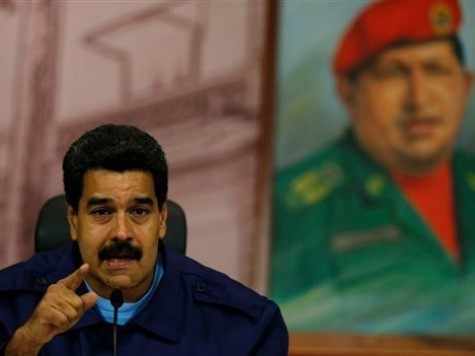Venezuelan President Nicolás Maduro is currently en route to China to ask President Xi Jinping for some much-needed financial assistance in light of an oil crisis that has left a mismanaged and increasingly impoverished Venezuela on the brink of disaster.
In a televised speech Sunday night, Maduro announced that he would leave on Sunday en route to Beijing. “I am going to a pivotal tour to the People’s Republic of China, invited by Chinese President Xi Jinping, in order to work on diverse projects of economic, financial, energy, technological, and educational character, for the development of infrastructure,” he explained. During his visit, Maduro will participate in the China-CELAC forum, organized in part by the eponymous Community of Latin American and Caribbean States.
He added in his public remarks that he also intends to visit “various OPEC nations to continue efforts at the highest level for a recovery strategy.” He did not specify, however, which OPEC countries he would visit.
The announcement of his tour follows news last week that Venezuela had officially entered a recession, and the nation’s annual inflation rate had surpassed 63%. Numerous experts are predicting that, given the current rates of inflation, 2015 could finally be the year that Venezuela’s socialist economy experiences hyper-inflation, a devastating phenomenon for an already weakened economy.
During his tenure, Maduro has imposed price controls on a number of essential goods, which has triggered a significant scarcity of milk, flour, and vegetable oil, among other goods, and generated an extensive black market for those seeking to buy such products. The black markets have evolved into “pop-up” street markets where individuals sell whatever they have–often including items like laundry detergent and deodorant–in public streets.
The economy was already in a precarious situation before the significant plunge in oil prices that has damaged numerous world economies, from Saudi Arabia and Iran to Russia, but oil prices appear to have brought the nation to a tipping point. As the Agence France-Presse reported last October, Venezuela depends on oil for 96% of its budget. At the time, experts estimated that the price of oil per barrel would have to reach $135 for Venezuela’s government to keep spending at the current rate. It is currently under $54 per barrel.
The oil price drop has even triggered some finger-pointing within OPEC itself, independent of Venezuela. In an interview with Reuters last week, Iran’s Deputy Foreign Minister Hossein Amir Abdollahian called for Saudi Arabia to act to stop oil prices from dropping further, remarking, “If Saudi does not help prevent the decrease in oil price … this is a serious mistake that will have a negative result on all countries in the region.”

COMMENTS
Please let us know if you're having issues with commenting.